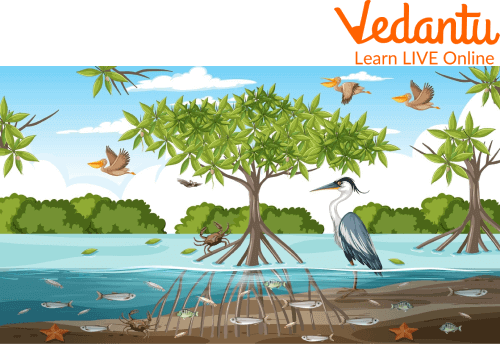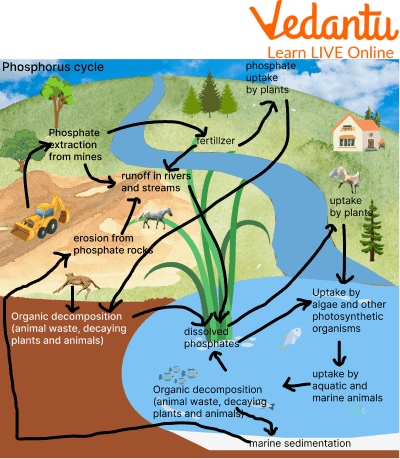




What Makes Wetlands Vital? Key Functions, Types & Exam Insights
Wetlands are known to be a type of water body. Wetlands constitute an area of land that is covered by water. The soil in these wetlands can be used for farming during the growing season. There are certain characteristics of wetlands that create some amazing facts about them. Our planet has so many things yet to reveal and it is quite amazing that scientists and researchers have grasped some amazing wetland facts and characteristics of wetlands. Let us learn about some of the best and most amazing wetland information.

Wetlands
Formation of Wetlands
Before we discuss facts about wetlands, it is important to know how wetlands are formed in the first place. The answer is that they are formed when water gathers on top of the soil and thus a wetland is formed. The formation of wetlands by humans in agricultural fields explains the freshwater wetlands that are used for cultivating certain crops. However, freshwater wetlands that are formed in certain places include freshwater and they remain flooded. The fertility in these freshwater wetlands could be one of the best fertilisers for crops because they consist of sedges, grasses, and emergent plants.

Formation of Wetlands
Types of Wetlands
Surprisingly, there is not just one single type of wetlands found on the planet because there are many types of wetlands. Researchers have got a hold of four types of wetlands and wetland information for each type of wetland differs when it comes to its characteristics. The four types of wetlands are:
Marsh wetlands
Swamp wetlands
Bog wetlands
Fen wetlands
Also, there were some experts who said that wetland types are not just limited to the above four types of wetlands only. These experts have recognized wet meadows and aquatic ecosystems as the other two additional types of wetlands.
Life in Wetlands
You would be surprised to know that irrespective of what size may be, life may exist in wetlands as well. Life in wetlands has become quite suitable for certain types of plants because they have adapted to water logging underneath. The only fact that certain types of plants survive in wetlands is because of the nutrients trapped in the bottom of the water.
Wetlands have a direct effect on human beings and as well as animals. It was found that wetlands are responsible for purifying and replenishing our water. Apart from that, rice is cultivated in wetlands which after harvesting is responsible for feeding a billion people.
Amazing and Exciting Facts about Wetlands
It is time to know some of the unknown and exciting facts about wetlands. These facts that are mentioned below also reveal some of the most interesting wetland information that you should know about.
Water is the main constituent of a wetland. Apart from the soil, minerals and nutrients, water is the main constituent of a wetland.
Wetlands are home to a wide variety of living species. Yes, not just small fishes and plants but there are several different species that depend on wetlands to live.
More than 20,000 species depend on wetlands to survive. Wetlands have a great influence on human beings as well because they are responsible for making lands fertile.
Wetlands also mean they are natural water filters. Nature never stops surprising us and it is the same about wetlands as well. Some wetland information suggests that they might be salty or just normal but they can be a great water filter.
Wetlands can store more carbon than rainforests. It is said that rainforests contribute the most oxygen and take in carbon but the interesting fact is that it is wetlands that take in the most carbon.
Summary
Wetlands have contributed to nature almost as equally as any other natural thing in the world. Life in wetlands becomes food for some animals and also has an effect on agricultural lands as well. Many animals and plants survive because wetlands form and remain flooded for many seasons. Wetland information that is studied today may not be all because many experts say that there are still so many types of wetlands that have not been identified yet. We hope you enjoyed reading this article, in case of any other doubts, feel free to ask in the comments.
FAQs on Wetland Facts: Definitions, Examples & Importance
1. What are the main characteristics that define a wetland?
A wetland is identified by three key characteristics. Firstly, it has hydric soil, which is soil that is permanently or seasonally saturated with water, resulting in anaerobic (low oxygen) conditions. Secondly, the area is covered by water for at least part of the year, especially during the plant growing season. Lastly, it supports hydrophytes, which are plants adapted to live in wet soil conditions.
2. Why are wetlands so important for the environment and for people?
Wetlands are critically important ecosystems that provide numerous benefits. Their importance includes:
Biodiversity Hotspots: They provide habitats for a vast range of plants and animals, including many rare and endangered species.
Flood Control: They act like natural sponges, absorbing and storing excess rainfall, which helps to reduce flooding in nearby areas.
Water Purification: They filter pollutants, sediments, and excess nutrients from water, naturally improving its quality.
Food Production: They are essential for agriculture, especially for cultivating rice, which is a staple food for billions of people.
3. What are the main types of wetlands?
Wetlands can be broadly categorised based on their vegetation and water source. The four primary types are:
Marshes: These are wetlands dominated by soft-stemmed, herbaceous plants like cattails and reeds. They can be freshwater or saltwater.
Swamps: These are wetlands characterised by woody plants, such as trees and shrubs. The Sundarbans mangrove forest is a famous example of a swamp.
Bogs: These are freshwater wetlands with spongy peat deposits, acidic waters, and a floor covered by a thick carpet of sphagnum moss.
Fens: Similar to bogs, fens are peat-forming wetlands, but they receive water from groundwater, making them less acidic and higher in nutrients.
4. What kinds of animals and plants are typically found in wetlands?
Wetlands are teeming with life. Plant life, or flora, is dominated by hydrophytes such as water lilies, cattails, reeds, and mangrove trees. The animal life, or fauna, is incredibly diverse and includes various species of birds (like herons and ducks), amphibians (frogs and salamanders), reptiles (turtles, alligators), fish, and countless insects.
5. How is a wetland different from a lake or a pond?
While all are water bodies, a wetland is distinct from a lake or pond. The primary difference is water depth and vegetation. Wetlands are typically shallow enough to support rooted aquatic plants throughout the entire area. In contrast, lakes and ponds have deeper, open-water zones where rooted plants cannot grow. Furthermore, wetlands are defined by their unique hydric soil.
6. Why are wetlands often called the ‘kidneys of the Earth’?
Wetlands are called the ‘kidneys of the Earth’ because of their remarkable ability to purify water. Just as human kidneys filter waste from the blood, wetlands trap sediments, and their plants and microorganisms absorb and break down harmful pollutants and excess nutrients (like nitrogen and phosphorus) from the water that flows through them, making it cleaner.
7. How do wetlands help in the fight against climate change?
Wetlands play a crucial role in regulating the global climate by acting as powerful carbon sinks. The plants and soil in wetlands capture and store vast amounts of carbon from the atmosphere. Peatlands, a type of wetland, are the largest terrestrial carbon store. By holding onto this carbon, wetlands prevent it from being released as carbon dioxide, a major greenhouse gas.
8. What is a Ramsar Site, and why is it important for wetland conservation?
A Ramsar Site is a wetland that has been designated as being of international importance under the Ramsar Convention, an intergovernmental environmental treaty. This designation is important because it commits the host country to work towards the wise use of the wetland and to conserve its natural resources, bringing global attention and support for its protection.
9. What are some famous examples of wetlands in India?
India is home to many significant wetlands, several of which are recognised as Ramsar Sites. Some famous examples include the Sundarbans in West Bengal (the world's largest mangrove forest), Chilika Lake in Odisha (a large saltwater lagoon), and Loktak Lake in Manipur (famous for its floating islands or 'phumdis').









